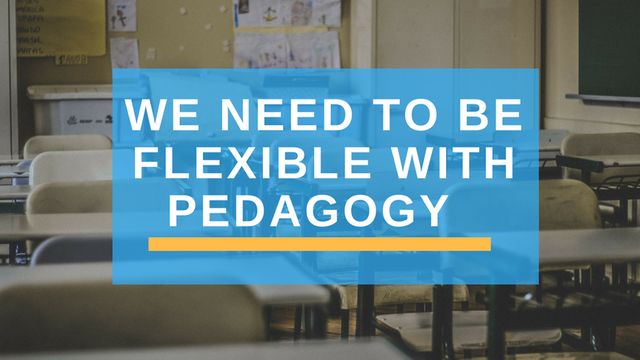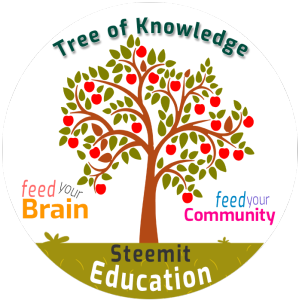We Need To Be Flexible With Pedagogy

Pedagogy is what differentiates "real" teachers from the non-graduates. At least, that's what they say. However, I've always thought otherwise. Anyone with something of value to impart can be a good teacher. You don't need to dominate a set of tools (graduates have) in order to successfully convey knowledge.
I'm not diminishing the importance of well-prepared professors in the educational field, but to be a competent teacher just requires common sense. That's the start. In some culture, you need to be a "real" teacher to gain a little appreciation. But the teacher authority shines during his or her performance in class.
Nothing can be well assessed without a broad consideration. And this statement clearly sticks out in education. When we see children being educated using old and rigid techniques, it immediately tells you that there's has to be a fracture in the system.
Being a teacher has showed me different strategies. But have we had the courage to dismiss them IF they are not functional in class? Sadly, most of us insist on them as if they were sacred rules.
Nevertheless, we can obtain good insights from them If we give them a critical thinking... because sometimes you're taught about something that you know it won't work. And you should take that as a reference of what must be avoided.
In the following paragraph, I will detail about the foundations of these techniques.

The problem with pedagogy
Whenever we teach, it is supposed that we should follow certain paradigms that are reflected in a manual. This handbook may point out how to behave during class and how handle students. But the general pedagogy never takes into account the unpredictable factors that are regularly present.
Here's when we face the diverse students' reactions, not only behavioral but also intellectual, which are closely connected. Pedagogy is impregnated with a body of rules that mainly prescribe.
It's like telling you what to expect. But students come from different houses, and have diverse backgrounds. There might be some similarities but each of them can show peculiar reactions that not a book highlights.
Times have changes, so pedagogy has to keep up with it. It must be ever-changing. And the base has to be description oriented through observation. If none of this is considered, then pedagogy looses its real purpose to exist.

Imbue the classroom with a session vibe
There's nothing more boring and less alluring than a classroom structured with rows of seats lined up to face the teacher. It has always looked like as if these places have been built to instruct raw discipline. And though discipline is an important trait any student must have (self-discipline), the classroom environment should promote participation and distill confidence, discarding any restriction.
Some educational institutions have changed their infrastructures to inspire a more friendly and receptive environment, but the method of teaching are still out of date. The teacher has to change their concepts. They should be less orthodox. And when we see a teacher doing something different, we know right away that it's just a personal proposal.
So, I've personally approached teaching using a kind of conference approach with some alterations, of course. With this way, the teacher - beside of being a communicator - he or she guides the interaction, and opens windows for interventions so that the students can come in with ideas and inputs to enrich the lesson.
If I have to detail this approach, I'd describe it as the following:
Make the lessons a little conversational as if it were a brainstorming activity.
Keep the topics away from the obvious. Have students come into class prepared beforehand. (They should have a general idea of what will be discussed)
Break the lesson now and then to slip in some anecdotes or real life examples (This keeps students hooked up and piques their interest)
Don't wait for the end of the lesson to open a round of questions. There are queries that might come up on the spur of the moment, and trust me, you don't want to let go off a possible momentum.
I've personally tried this approach and students have showed more motivation and the percentage of engagement toward the topic of the class is considerably higher.

Learning is fulfilled when the roles interchange
Normally the teacher is the one who speaks most of the time. And it stands to reason since he or she transmits the knowledge. But this is less dynamic and somewhat tedious. I've always believed that we must transcend into something more productive where the students end up offering insights and proposing ideas; the pupils excelling and showing their capacities. And to get it done, the seed of discussion must be planted in their minds.
The idea has to be active participation and not just listening. The passive presence inside the classroom doesn't help the learning process... and worse, the threat of conformity prowls, threatening to settle down.
By @edave
Thumbnail: Source
Check out my other posts below from the teaching series from a teacher's angle.

Previous Posts From This Series
Community Service On Educational Institutions: Obligation Or A Willingly Deed?
Why Do Some Of Us Learn More Outside The Educational Environment?






Congratulations @edave your post had been selected for an upvote worth ~$1.00 as part of the @ecoTrain minnow support project. Your upvote will come soon!
I hope this encourages you to keep writing amazing posts and making this world a better place!.
JOIN US ON DISCORD
https://discord.gg/XwAmRWW